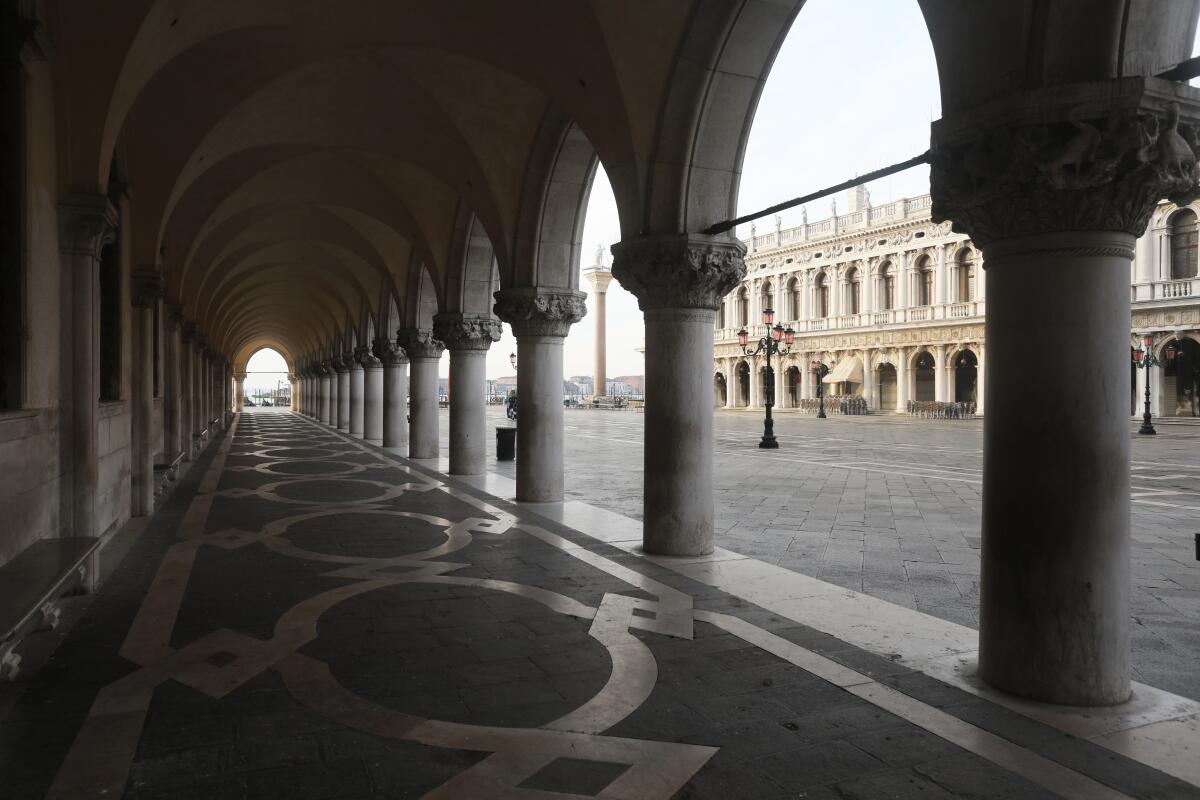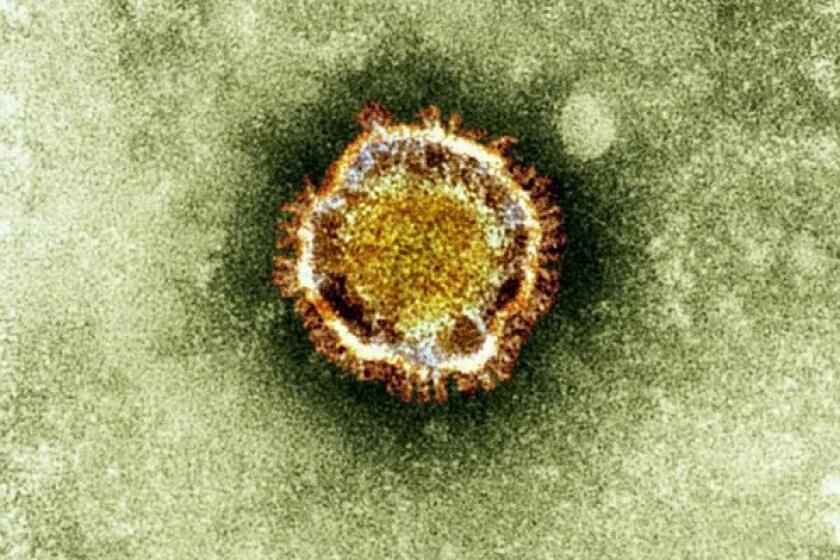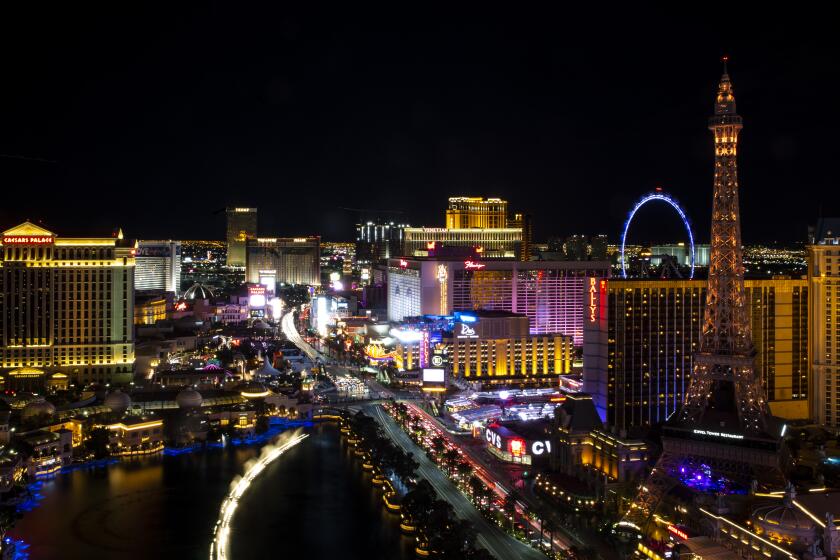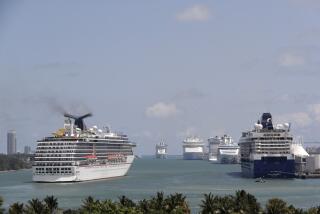What will it cost to change your travel plans amid coronavirus fears?

- Share via
There are about 110,000 confirmed cases of the new coronavirus worldwide, according to the World Health Organization. And more cases are reported in new places every day. As a result, travelers (especially those who have underlying health problems) may want to cancel or postpone upcoming vacation plans.
How do you know if it’s safe? You don’t. A lot depends on you, your health and your tolerance for risk. Here are essential questions you must ask yourself.
Should I cancel my cruise?
It depends on whether you’re OK with putting yourself at higher risk of getting the disease, but that’s not a risk federal health officials recommend taking. The Centers for Disease Control and Prevention on Sunday came out with its strongest advice yet for all people, especially those with underlying health issues, to “defer all cruise ship travel worldwide.”
“Cruise ships are unique because you are keeping people in repeated contact over a long period of time,” said Dr. Amy Stone, a virologist from Touro University Nevada in Henderson. That means if someone on the ship is infected, you face a higher risk of being exposed to them repeatedly — in dining areas, common restrooms, on the dance floor, etc. — and contracting the coronavirus.
The cruise industry shot back Sunday by promising to tighten health and safety protocols. The Cruise Lines International Assn. said ships will, “as soon as they are capable,” take the temperature of every passenger when they board to check for fever. It also promised more screenings and medical support for people showing symptoms of COVID-19. No details were given on what those enhanced screenings would entail.
Two high-profile coronavirus outbreaks occurred on cruise ships, first the Diamond Princess, which was quarantined off Yokohama, Japan, in February; and then the Grand Princess, which finally was allowed to dock Monday in Oakland after completing a cruise to Mexico in which 21 passengers and crew members tested positive for the disease. A man in Northern California died from coronavirus after taking the cruise.
Will I lose money if I cancel my cruise?
You likely won’t get a refund, but you shouldn’t lose money either, depending on when you are scheduled to sail. Cruise lines are allowing passengers to cancel their voyages, some with as little as 48 hours’ notice, and receive a full credit for a future sailing later this year or next year. The offer also is good for future reservations.
However, the sailing dates to qualify for the full cruise credit vary. Check out revised cancellation rules at these cruise lines and the departure dates that qualify. Check with your travel agent or cruise line for information about your options.
Should I cancel my flight?
Prices are dropping as airlines try to fill seats, vacated because of the overcapacity and the threat of a pandemic from the coronavirus.
The CDC isn’t advising travelers not to fly, so again, it depends on your risk tolerance for getting sick. The CDC did, however, advise older adults and those with health problems to avoid crowded places and long plane trips (in addition to avoiding cruise ships). And here’s a twist: As a result of canceled and postponed events, airlines are left with empty seats, which has brought cheaper fares.
Will I lose money if I cancel my flight?
It depends. You may be eligible for a refund if your flight was canceled, which means you wouldn’t lose a dime. Or the airline may give you receive credit for a future flight to be used within a certain period, usually within a year. Or you may be allowed to postpone your flight without paying a change fee. However, if you change the date of your flight, you still might have to pay more if the new date affects the cost of the ticket.
Still want to go? Note that some travel destinations are pretty much off the table. The CDC’s Level 3 risk assessment advises travelers to avoid any “nonessential travel” to China, Iran, South Korea and Italy. It also tells travelers with chronic medical conditions to postpone travel to Japan (Level 2) and practice health precautions in Hong Kong (Level 1).
Scott’s Cheap Flights posted a handy round-up of each airline’s fee waiver policies for changes and cancellations. The rules vary by airline, so check with your travel agent or your airline to find out more.
What if I bought travel insurance? Am I covered?
“Unfortunately, there is limited cancellation coverage [for coronavirus] under most standard travel insurance policies,” Kasara Barto of Squaremouth.com, a travel insurance comparison site, told The Times in an email. “Virus outbreaks do not fall under the standard cancellation reasons on most travel insurance.”
Travel editor Catharine Hamm took a deep dive in this Q&A about what coverage does and doesn’t mean. Insurers may have set a deadline by which you would have had to have purchased a policy that covers coronavirus. And even cancel-for-any-reason insurance doesn’t mean you’ll be fully reimbursed for nonrefundable travel costs; many such policies cover about 75% of what you paid.
Will I lose money if I cancel my Amtrak ticket?
No. Amtrak is allowing customers with existing or new reservations made before April 30 to change the date of their travel without paying change fees. Online users may log into their Amtrak.com account and select “modify trip” or call (800) 872-7245 to make the change. A fare difference may apply to your new itinerary.
Note too Amtrak is suspending three high-speed Acela routes between Washington, D.C., and New York City due to a fall-off in ridership blamed on coronavirus fears, according to media reports.
Where can I find health and travel updates regarding the coronavirus?
A face mask won’t do much to protect you from the new coronavirus from China. If you want to reduce your risk of getting sick, focus on washing your hands.
The Los Angeles Times’ Health: Coronavirus web page provides news about the outbreak in California and elsewhere, and tips about what you can do to avoid getting infected. Also, the CDC’s Traveler’s Health website and the World Health Organization’s coronavirus disease information page provide solid information about what’s happening worldwide with the coronavirus oubreak.
More to Read
Sign up for The Wild
We’ll help you find the best places to hike, bike and run, as well as the perfect silent spots for meditation and yoga.
You may occasionally receive promotional content from the Los Angeles Times.









